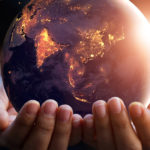
Humanity has entered a new era. Our technological prowess has brought humanity to a crossroads. We are the inheritors of two centuries of remarkable waves of technological change: steam power, railroads, the telegraph, electrification, automotive transport, aviation, industrial chemistry, modern medicine, computing, and now the digital revolution, biotechnologies and nanotechnologies. These advances have reshaped the world economy into one that is increasingly urban and globally connected, but also more and more unequal.
However, just as humanity confronted “Revolutionary Change” (Rerum Novarum) in the Age of Industrialization in the 19th century, today we have changed our natural environment to such an extent that scientists are redefining the current period as the Age of the Anthropocene, that is to say an age when human action, through the use of fossil fuels, is having a decisive impact on the planet. If current trends continue, this century will witness unprecedented climate changes and ecosystem destruction that will severely impact us all.
Human action which is not respectful of nature becomes a boomerang for human beings that creates inequality and extends what Pope Francis has termed “the globalization of indifference” and the “economy of exclusion” (Evangelii Gaudium), which themselves endanger solidarity with present and future generations.
The advances in measured productivity in all sectors — agriculture, industry and services — enable us to envision the end of poverty, the sharing of prosperity, and the further extensions of life spans. However, unfair social structures (Evangelii Gaudium) have become obstacles to an appropriate and sustainable organization of production and a fair distribution of its fruits, which are both necessary to achieve those goals. Humanity’s relationship with nature is riddled with unaccounted for consequences of the actions each of us take for both present and future generations. Socio-environmental processes are not self-correcting. Market forces alone, bereft of ethics and collective action, cannot solve the intertwined crises of poverty, exclusion, and the environment. However, the failure of the market has been accompanied by the failure of institutions, which have not always aimed at the common good.
Problems have been exacerbated by the fact that economic activity is currently measured solely in terms of Gross Domestic Product (GDP) and therefore does not record the degradation of Earth that accompanies it nor the abject inequalities between countries and within each country. The growth in GDP has been accompanied by unacceptable gaps between the rich and the poor, who still have no access to most of the advancement of the Era. For example, about fifty-percent of available energy is accessed by just one billion people, yet the negative impacts on the environment are being felt by the three billion who have no access to that energy. Three billion have so little access to modern energy that they are forced to cook, heat and light their homes with methods dangerous to their health.
The massive fossil fuel use at the heart of the global energy system deeply disrupts the Earth’s climate and acidifies the world’s oceans. The warming and associated extreme weather will reach unprecedented levels in our children’s life times and 40% of the world’s poor, who have a minimal role in generating global pollution, are likely to suffer the most. Industrial-scale agricultural practices are transforming landscapes around the world, disrupting ecosystems and threatening the diversity and survival of species on a planetary scale…
In view of the persistence of poverty, the widening of economic and social inequalities, and the continued destruction of the environment, the world’s governments called for the adoption by 2015 of new universal goals, to be called Sustainable Development Goals (SDGs), to guide planetary-scale actions after 2015. To achieve these goals will require global cooperation, technological innovations that are within reach, and supportive economic and social policies at the national and regional levels, such as the taxation and regulation of environmental abuses, limits to the enormous power of transnational corporations and a fair redistribution of wealth. It has become abundantly clear that Humanity’s relationship with Nature needs to be undertaken by cooperative, collective action at all levels — local, regional, and global…
We have the innovative and technological capability to be good stewards of Creation. Humanity needs urgently to redirect our relationship with nature by adopting the Sustainable Development Goals so as to promote a sustainable pattern of economic development and social inclusion. A human ecology that is healthy in terms of ethical virtues contributes to the achievement of sustainable nature and a balanced environment. Today we need a relationship of mutual benefit: true values should permeate the economy and respect for Creation should promote human dignity and wellbeing.
These are matters on which all religions and individuals of goodwill can agree. These are matters that today’s young people around the world will embrace, as a way to shape a better world. Our message is one of urgent warning, for the dangers of the Anthropocene are real and the injustice of globalization of indifference is serious. Yet our message is also one of hope and joy. A healthier, safer, more just, more prosperous, and sustainable world is within reach. The believers among us ask the Lord to give us all our daily bread, which is food for the body and the spirit.
Photo: Shutterstock by PopTika








